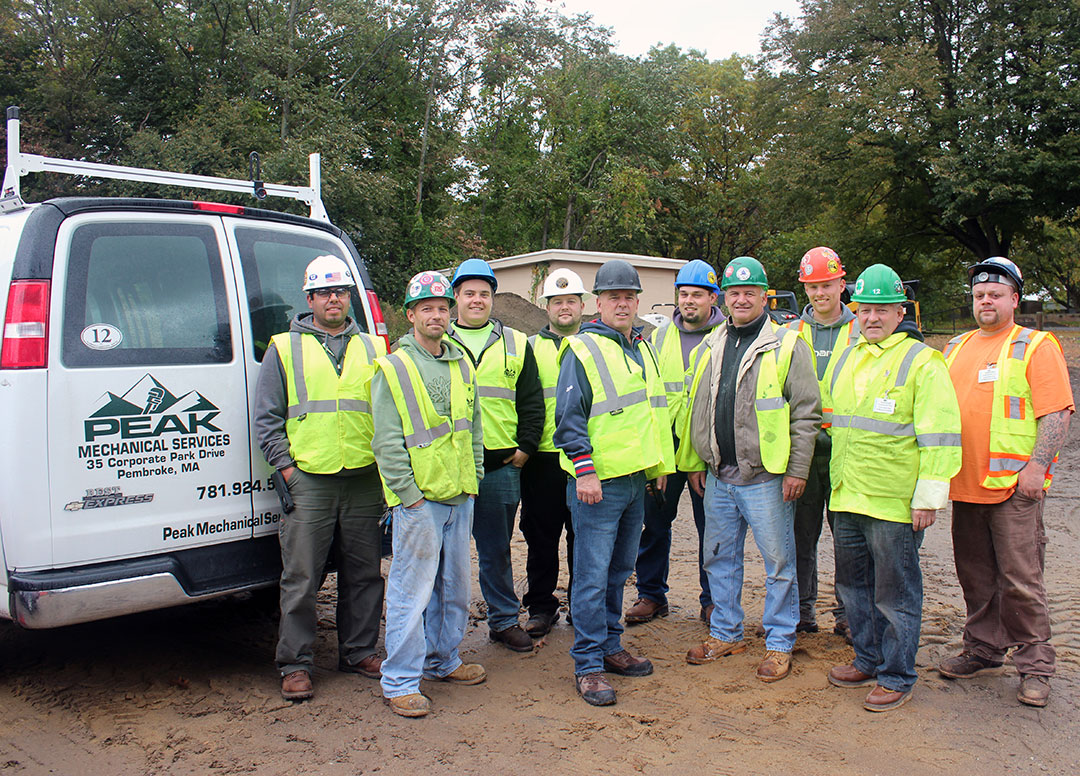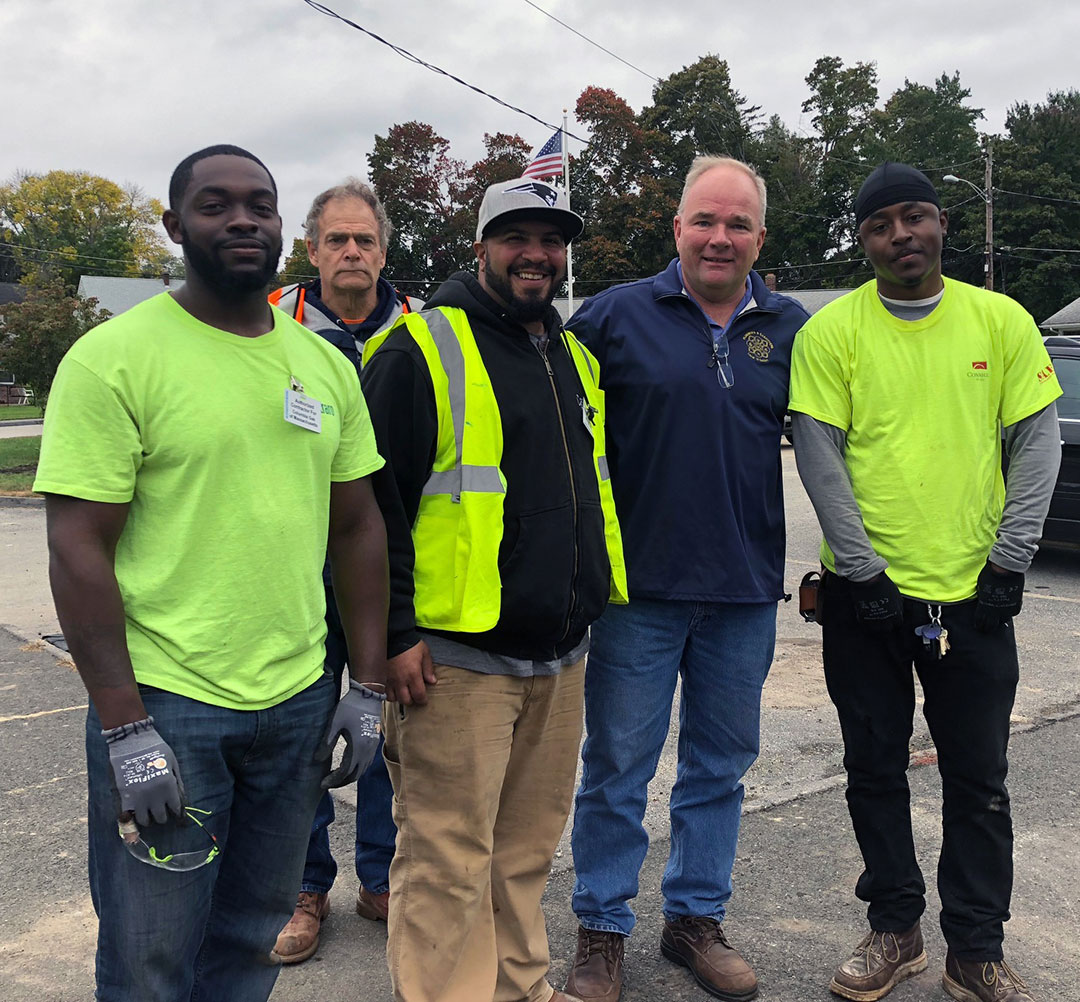GBPCA Contractors and Local 12 Plumbers on Merrimack Valley Recovery Front Line
People typically take plumbing and heating systems for granted—until something goes wrong. Then they realize the critical roles that plumbers and gasfitters play.
Things went horribly wrong in Lawrence, Andover, and North Andover on September 13 when a natural gas disaster caused explosions and fires throughout the communities. One person was killed, two dozen people were injured, and many properties sustained damage. About 8,400 Columbia Gas customers had their service shut off, and, in the weeks that followed, have had to cope with the loss of heat and hot water as well as the use of their gas-fueled appliances. An army of Local 12 plumbers representing many Greater Boston Plumbing Contractor Association members has been playing a critical role in the recovery effort.
As with any large-sale catastrophe and emergency response, the challenges have been daunting, and the process has been trying at times. For example, Columbia Gas originally said that it would fully restore service by mid-November, but it struggled to meet its deadline and needed to extend it. Still, homeowners and businesses are thrilled when the recovery team’s plumbers knock on their doors.
“People in the Merrimack Valley have been so grateful for our help and so gracious to us,” says Harry Brett, business manager for Local 12. “They know that we are the ones that will get them heat and hot water.”
There is no way to predict when disaster strikes, of course, but the timing of the Columbia Gas debacle couldn’t have been worse in terms of marshaling plumbers to help. The construction industry is booming, and contractors and mechanics are exceptionally busy working on projects around the region. Nonetheless, GBPCA contractors and Local 12 members have been leading the way and providing the majority of plumbers and gasfitters for the recovery effort.
“I’m very proud that our contractors have answered the call,” says Jeremy Ryan, GBPCA’s executive director. “They understand the dire need, and have made adjustments so that they can be part of the response.”
In the wake of the disaster, Governor Charlie Baker’s office contacted the GBPCA and Local 12 to inquire about sending help, and both organizations sounded the alarm. 16 GBPCA contractors have joined the recovery team (see sidebar). Brett reached out to other United Association locals, and ones based in New Hampshire, Central Massachusetts, Western Massachusetts, and as far away as New York, Maryland, and Texas have sent plumbers to the Merrimack Valley.
Jim Vaughan, business agent for Local 12, has been working with the plumbers and contractors and coordinating the UA response. “These people are hurting,” he says, referring to displaced residents who have sought alternative housing as well as ones who are trying to tough it out by remaining in their homes as temperatures have plummeted. “We are trying to do everything we can to make it possible for them to return home and get their lives back to normal.”
The recovery team works twelve-hour shifts, seven days a week. There is a large contingency of plumbers during the week. But their ranks swell to hundreds on the weekend as plumbers working on other jobs pitch in on their days off to help.

A crew from Peak Mechanical Services, led by John Ahl (center), is on the scene in Andover.
“We call them the weekend warriors,” says John Ahl, general foreman for Peak Mechanical. The contractor with the most plumbers on site for the recovery effort, Peak has about 65 mechanics during the week and as many as 300 reporting for duty on Saturdays and Sundays.
The plumbers are part of assessment groups that include electricians and representatives from Columbia Gas and Gilbane, the general contractor that has been contracted by the utility company to manage the recovery process. The groups have been going property to property to test systems, assess the damage, and identify what needs to be replaced and repaired. The plumbers disconnect meters, boilers, hot water heaters, and all appliances and then perform a gas test to determine each home’s ability to withstand pressure.
According to Ahl, more than 50% of the systems have been failing the initial tests. They require repairs before their gas supplies can be restored and the properties can be considered “house ready.” There have been other factors that have slowed the recovery process. For example, many of the buildings are old and have pre-existing conditions such as compromised venting systems, chimneys that are overloaded, or bad couplings and fittings that need to be addressed.

Jim Vaughan (2nd from right), business agent for Local 12, meets with some of the plumbers helping residents and businesses recover.
“We completely understand that people are anxious to get their systems up and running,” Vaughan says. “But safety is our first priority. We need to make sure that everything meets building code specifications.”
Initially, the recovery teams were replacing all boilers, hot water heaters, and other appliances with new fixtures. To help speed up the recovery, plumbers and gasfitters began repairing appliances when possible. They will return later to install new fixtures.
In some cases, plumbers and gasfitters completed all of the work inside a home or business, but needed to wait until Columbia Gas brought its gas supply to the property as the last piece of the puzzle. In late October, the utility announced that it had replaced all 45 miles of damaged gas mains in the three communities, three weeks ahead of schedule.
Peak Mechanical’s Ahl says that things can get frustrating and a bit overwhelming for everyone. But he tries to keep everything in perspective and reminds his workers that it is a major recovery effort and that they need to take it one step at a time. “I tell them to make it personal,” he says. “Consider what it would be like if your own family didn’t have heat or hot water. That’s what keep us going.”
Yes, the plumbers are getting paid for their work, Ahl acknowledges. At the same time, a lot is being asked of them. They are working long shifts for days on end in all kinds of conditions. Many have put their personal lives on hold. “In some ways, this could be considered humanitarian work,” he says.
Helping people at a time of need is something that was instilled in Ahl by his father, Charles R. Ahl, a former business manager for Local 12. “Charity was important to my dad,” he says. “I believe his lessons helped prepare me to lead my crew here in the Merrimack Valley.”
